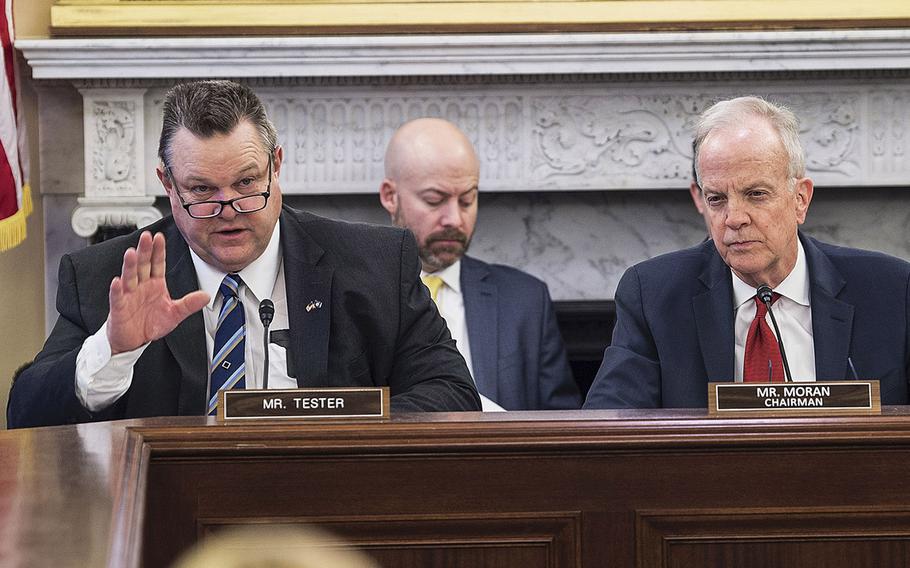
Sens. Jon Tester, D-Mont., left, and Jerry Moran, R-Kan., attend a hearing on Capitol Hill on Feb. 5, 2020. According to reports on April 29, 2021, the two senators intend to combine into one large piece of legislation a number of proposed bills to help veterans suffering from illnesses believed to be caused by toxic exposure during overseas deployments. (Carlos Bongioanni/Stars and Stripes)
WASHINGTON — A contingent of Democrats and Republicans is working to reform how the Department of Veterans Affairs handles claims of military toxic exposure, taking advantage of what the lawmakers call a historic opportunity to make comprehensive change.
During this congressional session, lawmakers have introduced two dozen bills to help veterans suffering from illnesses believed to be caused by toxic exposure during overseas deployments. These veterans face difficulty securing benefits through the VA, often having to fight through multiple rejections.
Some of the bills focus on veterans of certain eras; others address specific illnesses believed to be caused by toxic exposure. Senators Jon Tester, D-Mont., and Jerry Moran, R-Kan., leaders of the Senate Veterans’ Affairs Committees, intend to combine many of the bills into one large piece of legislation.
“Every year, Congress considers numerous exposure-related bills,” Tester said. “What has emerged is a broken process and disjointed coverage for veterans. While each legislative victory is a step in the right direction, it’s clear that our next step must be bold.”
Tester and Moran plan to finish work on the bill and pass it through the Senate committee before Memorial Day. Tester believes if they make that May 31 deadline, the bill could be approved by Congress by the end of the year.
“I fully agree with it and will support and help you accomplish that goal,” Moran said.
The VA has the authority to clear a pathway to benefits for veterans suffering the effects of toxic exposures. However, the agency has been “sluggish” to do so, Moran said, compelling Congress to take action.
VA officials disagree. The senators held a hearing about the issue Wednesday afternoon, during which the agency said it was “premature to legislate” the issue.
Robert Burke, deputy undersecretary for policy and oversight at the VA, said the department wasn’t ready to take a position on any of the bills related to toxic exposure.
“There are no bills with respect to toxic exposure that we have a position on,” Burke said. “There is goodness in each of these bills. Our lack of position should not be taken as us not seeing value in these proposals.”
Instead, the VA is encouraging veterans to file claims that can be decided on a case-by-case basis. Burke said that the agency – at the direction of VA Secretary Denis McDonough – is committed to looking at a greater range of data and analysis when deciding the claims.
“Our secretary has directed us to look at this in a different way – a way faster for veterans, a way to include more data analysis,” Burke said. “He has a sense of urgency, it’s not something he has an interest in delaying.”
Still, lawmakers plan to move forward with creating comprehensive legislation to change the process. National veterans’organizations voiced support for the idea Wednesday. Vietnam Veterans of America, Disabled American Veterans, Veterans of Foreign Wars and the Wounded Warrior Project all testified that they were in favor of combining multiple bills.
“This is an unbelievable time,” said John Rowan, national president of Vietnam Veterans of America. “All the bills have a little piece of the pie that could create an omnibus bill to hopefully take care of all these veterans.”
VVA has fought for decades to secure benefits for veterans exposed to the chemical herbicide Agent Orange during the Vietnam War. Recently, Congress approved bills to help veterans suffering from bladder cancer, hyperthyroidism and Parkinson’s-like symptoms, as well as veterans who served aboard ships in open waters off the coast of Vietnam. The group is still fighting for veterans who developed hypertension as a result of exposure.
Lawmakers and advocates have said they want to avoid repeating this delayed, piecemeal approach for younger veterans exposed to burn pits and other toxins.
Throughout the 1990s and the post-9/11 wars, the military used open-air pits to burn garbage, jet fuel, paint, medical waste, plastics and more. Veterans diagnosed with cancer, respiratory issues and lung disease at young ages have blamed exposure to the toxic fumes.
Many of the bills introduced in Congress this year have been focusedon veterans andburn pits. Others aim to secure benefits for more Vietnam War veterans, as well as “atomic” veterans who participated in the military cleanup operation of radioactive sites in the Pacific Ocean in the 1970s.
Some lawmakers introduced the bills this session because of the support they believed would come from the White House.Biden has said he believes toxic smoke is to blame for brain cancer that killed his son Beau in 2015. Beau Biden was a major in the Delaware Army National Guard and was exposed to burn pits during a deployment to Iraq.
“We have a unique opportunity to address toxic exposures and create a future framework for the estimated 3.5 million veterans exposed to burn pits,” said Shane Liermann, deputy national legislative director for Disabled American Veterans. “We must not miss this opportunity.”
Twitter: @nikkiwentling